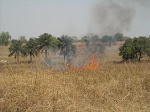I came back to post after traveling a bit for some Peace Corps functions to find my little Beninese village flooded with people. Loud music emananted out of "downtown" and the streets were so choked with human beings my zemidjan was hard pressed just to drop me off at the house. Looking around I saw large, loud women dressed to the nines in colorful matching outfits with outlandish headwraps, invading the surrounding airspace at odd angles. A brass band errupted into noise and rythm with abandon. A voice from deep within the ever-expanding crowd was struggling with a microphone and the touchy, generator-fueled technology that supported it. A fete (festival) was in full swing.
I had been waiting for this particular fete almost since I first arrived back in September and was ecstatic that it had finally come. This, I knew, would be a full week-long fiesta in which every current and past resident of the village returns to party, dance, and discuss the community's future development. But mostly to party.
The result was often a strange mix: young men returning from bigger cities like Parakou, Cotonou, or even Niamey had come back sporting corn-rows and long, silver chains with "50cent" medallions. They looked more like American youths coming back from a concert in comparison with the shaven village boys who wore worn, hand-me-downs bought at the local market. Returning women exuded wealth with their elaborate outfits, hairstyles, and manicures, and men with flashy new motorcycles and cellphones. I heard French more and more, and was called "yovo" so much it felt like the past eight months had been erased and I had just stepped off the plane.
Each regional group (e.g. all those returning from Cotonou) had prepared their own unique dance which was performed for the crowd throughout the week. When a dancer was thought to be good, candy was stuck to their forehead--when they were really good, money. Here again was an opportunity to display one's success and accumulated wealth in the difference between a 25 franc piece, 500 franc piece, or 1.000 franc paper bill that one plastered across the forehead of a particular dancer. At night when the performances were finished the youths took over, blasting popular music and dancing until all hours of the night.
During the day the elders held meetings to discuss the village's development. Held "downtown" under the mango and baobab trees, these meetings were often large and predominantly male (I never saw more than three women present, myself included). Ideas were presented, and grievances expressed. The progress on the new school being built just outside the village limits was reported as well as the past year's expenditure for the local village association (who hosted the fete). Generally, it was the local residents who did most of the talking.
The entire week the village was charged with an electric energy--the village was full, things were happening, people were happy. This carnival atmosphere sustained itself until Saturday. On Sunday everyone was gone; the village was empty again. Slowly, almost like a deflated balloon, villagers took up their old posts and jobs again and began to live the quiet, normal life they had briefly left during the fete.
I found out afterwards that the fete made national television--complete with several shots of the local American dancing along with the best of them.
2 years ago
